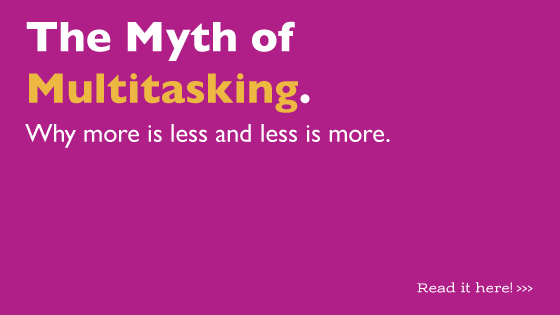As I came back to work this morning after a two-week vacation, I faced a mountain of things to do. Where to start? Maybe I could manage to do more than one task at a time. You know, answer email or scan Facebook while listening to an online class, or straighten the studio while making a phone call, or quickly check the calendar to see if an appointment is scheduled while in a phone conversation. Quite the picture, isn’t it?
Yes, I am talking about multitasking and it does not work! According to Harvard Business Review blogger Paul Atchley, studies show that multi-taskers are less efficient, perhaps by as much as 40%, than they think. He says that it takes an average of 15 minutes – and I have read numbers as high as 40 minutes – to reorient oneself to the main task. Wow – 15 minutes! Can you imagine how much time you waste on a daily basis trying to get back to the task at hand?
Many people dispute the fact that multi-tasking doesn’t work, citing their own experiences. Not true, as research shows again and again.
Studies continue to show that the brain is just not wired to focus on more than one task at a time, according to Earl Miller, a neuroscientist at MIT and an expert on divided attention. When you think you are multitasking, you are actually switching quickly between tasks and lowering the quality of your work. Miller says that every time you multitask, “there’s a cognitive cost in doing so.”
Miller goes on to say that, “multitasking creates a dopamine-addiction feedback loop, effectively rewarding the brain for losing focus and for constantly searching for external stimulation. … It is the ultimate empty-caloried brain candy. Instead of reaping the big rewards that come from sustained, focused effort, we instead reap empty rewards from completing a thousand little sugar-coated tasks.”
Still not convinced? Clay Shirky, an author and expert on the social and economic effects of the Internet, puts multitasking into perspective when he says, “it “provides emotional gratification as a side-effect. (Multitasking moves the pleasure of procrastination inside the period of work.) This side-effect is enough to keep people committed to multi-tasking despite worsening the very thing they set out to improve.”
Shirky actually banned note-taking on laptops in his college class because multi-tasking is such a distraction that it impacts negatively how students learn. Think about how you are distracted if you are researching on the Internet. You’ll be looking at one thing, and all of a sudden, you are distracted by the ad of something that you checked out earlier. It’s as if the goal of technology is to distract you.
Some studies have gone so far as to suggest that cognitive damage as a result of multi-tasking could be permanent, lowering IQ and decreasing brain density in the anterior cingulate cortex. (That’s the region of the brain that is responsible for empathy and emotional control.) Researchers came to this conclusion studying MRI scans on people using multiple devices at the same time, e.g., texting while watching television.
That’s enough to convince me to work on eliminating multitasking from my life. If you want to break your multi-tasking habit, here are seven tips:
-
Commit to focus on one task at a time. Atchley says our attention starts to wane after 18 minutes. He suggests that if that happens and you switch to a different task, make notes about the first task so it is easier when you go back. I think that if your attention wanes, it might be time for a quick stretch and then quickly re-focus on the same task.
-
Be sure to divide your project into doable tasks. Set a timer for the task. You may find it easier to focus if you have specifically set the time aside. You can find an online timer or use your iPhone alarm.
-
Eliminate distractions. This could be closing the door to your studio, letting the answering machine pick up the calls, stopping the audible tones of your e-mail, closing the extra browser windows. What is key is paying attention – again focus – to your task.
-
Use time blocking. In addition to blocking time for specific project work (see 1 and 2 above), set aside time for email, making or returning phone calls, and social media tasks.
-
Watch excessive research. When you set out to focus on a task, you can find yourself down a rabbit’s hole doing research. Set a limit on how much is necessary.
-
Track your interruptions (opportunities for multi-tasking) and look for ways to avoid them in the future.
-
Stick with your task until it is done. If you find yourself getting off track or your mind wandering, just take a short (five-minutes or less) break. Sit, breathe and acknowledge that you are off track. Don’t let the distractions lead you astray. Then get back to the task at hand.
And, if you think multitasking is only a problem today, here’s a good quote from Lord Chesterton, attributed to a letter to his son in the 1740s:
“There is time enough for everything in the course of the day if you do but one thing at once; but there is not time enough in the year if you will do two things at a time.”
Good luck eliminating multitasking from your list of “skills.” You’ll be better off without it. More is less and less is more.
What are your strategies to eliminate multitasking?
